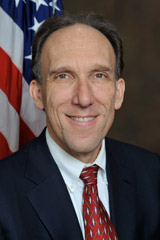Carl Shapiro
A major contributor to this article appears to have a close connection with its subject. (August 2016) |
This article contains promotional content. (August 2016) |
The topic of this article may not meet Wikipedia's general notability guideline. (August 2016) |
This article needs additional citations for verification. (August 2016) |
- For the Boston philanthropist, see Carl J. Shapiro; For the poet, see Karl Shapiro.
Carl Shapiro | |
|---|---|
 | |
| Born | 20 March 1955 |
| Nationality | United States |
| Academic career | |
| Field | Microeconomics |
| School or tradition | Neoclassical economics |
| Doctoral advisor | Richard L. Schmalensee[1] |
| Information at IDEAS / RePEc | |
Carl Shapiro (born 1955) is the Transamerica Professor of Business Strategy at the Haas School of Business at the University of California, Berkeley. He is the co-author, along with Hal Varian, of Information Rules: A Strategic Guide to the Network Economy, published by the Harvard Business School Press. On February 23, 2011, the Wall Street Journal reported that President Barack Obama intended to nominate Shapiro to his Council of Economic Advisers.[2]
Shapiro served as Deputy Assistant Attorney General for Economics in the Antitrust Division of the U.S. Department of Justice (1995–1996). He is a Senior Consultant with Charles River Associates and has consulted extensively for a wide range of private clients as well as for the U.S. Department of Justice and the Federal Trade Commission.
Shapiro is again the Deputy Assistant Attorney General for Economics of the Antitrust division of the Justice Department.[3]
Shapiro holds a BS in mathematics and a BS in economics from the Massachusetts Institute of Technology, a MA in mathematics from the University of California, Berkeley, and a PhD in economics from the Massachusetts Institute of Technology.
He also coined the term essential patent to cover a patent that was required to practice a given industry standard.[citation needed]
Publications
- Information Rules [2] (Harvard Business Press 1999; co-authored with Hal R. Varian)
References
- ^ Consumer information, product quality, and seller reputation.
- ^ WSJ Staff (February 23, 2011). "Nomination for Council of Economic Advisers". Wall Street Journal. Retrieved 26 February 2011.
- ^ "High-Tech Antitrust Cases: The Road Ahead [1]". Accessed 17 May 2009.
External links
